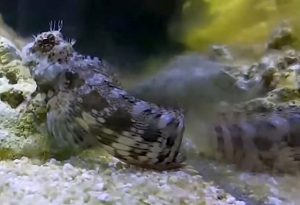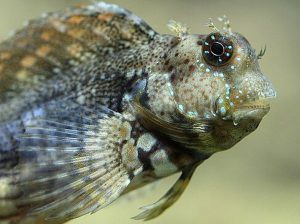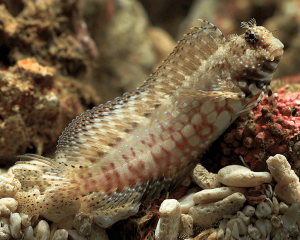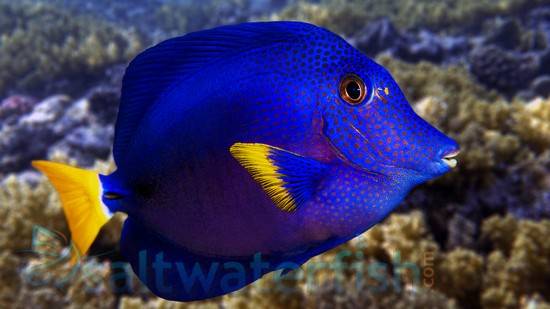The Lawnmower Blenny (Salarias fasciatus) known to tropical fish keeping enthusiasts as the Algae Blenny, Sailfin Blenny, Sailfin Algae Blenny, Rock Blenny, or Jewelled Rockskipper is native to Indo Pacific waters, including the Red Sea, the western Pacific Ocean, and the Great Barrier Reef in Australia.
Ranging from East Africa and the Red Sea, to Samoa and the Islands of Micronesia, the Lawnmower Blenny is a solitary species that is most often found on rocky shorelines and shallow coral reef flats with abundant growths of algae at depths from 1 to 30 feet.
The Lawnmower Blenny has an olive to brown, green, or gray elongated body; with dark bars, numerous round and elongated white spots, and an abundance of pale spots, anteriorly running dark streaks, and several darker bands that enables them to blend into their surroundings as they comb for algae.
The Jewelled Rockskipper has a large mouth, an oversize head covered with blue or black dots, dorsal and anal fins attached to the caudal fin, broad fanlike pectoral fins, and cirri (antanae) on their head between their black pronounced eyes. There are usually dark longitudinal lines on the front part of the body, and small bright blue spots with dark outlines along the rear part of the body that give them their Jewelled Rockskipper moniker.
Male Salarias fasciatus often have longer and more pronounced spines on their anal fins, while females tend to be slightly larger and rounder.
Like the Midas Blenny (Ecsenius midas), Salarias fasciatus can change colors depending on their mood.
The Lawnmower Blenny is a peaceful species that can be housed in a mature FOWLR or well established reef aquarium of at least 30 gallon capacity with a coralline gravel or live sand substrate, and plenty of live rock with healthy populations of microalgae and macroalgae arranged into crevices, ledges, caves, and overhangs for them to perch and graze on. Adequate lighting and a healthy algae population is crucial to fulfill their dietary needs.
Although the Lawnmower Blenny is considered reef safe, they are known to occasionally pick on small polyp stony corals and clam mantles in smaller tanks or when food is scarce.
The Lawnmower Blenny is generally peaceful towards other species unless the tank mate is similar in shape or appearance. It is best to house them alone unless kept in larger aquariums or as mated pairs.
The do well in mature FOWLR tanks with other peaceful species like Dottybacks, Flame Hawkfish, Dwarf Angelfish like the Coral Beauty, Anthias, Yellow Boxfish, Kole Tangs, etc.
Because they need a diet rich in algae and biofilm to breed and limited information about their spawning behavior is known; the Lawnmower Blenny is not commonly bred in captivity. The additional challenge to breeding is their aggression towards their own species. They are egg layers that produce adhesive eggs and plaggic larvae.
In their natural environment, the Lawnmower Blenny feeds on detritus, algae, and biofilm which they scrape from hard surfaces in the shallow reefs and lagoons that they reside in. Their diet includes decomposed organic matter, various types of filamentous algae and diatoms, small invertebrates and shelled protozoa, and occasionally sponges, small snails, and fish eggs.
In a well established aquarium with plenty of biofilm, live rock and algae growth, their diet should be supplemented with vegetable matter, spirulina, marine algae, and frozen herbivore preparations. Dried nori can be provided when natural algae is scarce.
A steady diet of microalgae and macroalgae is essential for the health and well being of this species.
The Lawnmower Blenny (Salarias fasciatus) is commonly available to tropical fish keeping enthusiasts as wild caught and aquacultured specimens from a variety of local aquarium shops and online retailers, wholesalers, and transhippers at prices that vary on size and area of collection.
Approximate purchase sizes: Small: 1″ to 1-1/2″; Medium: 1-1/2″ to 2-1/2″; Large: 2-1/2″ to 3-1/2″; XLarge: 3-1/2″ to 5″
Prices start at $22.49 for small, to $38.99 for medium specimens from the Philippines.
Minimum Tank Size: 30 gallon (90+ gallons for pairs)
Aquarium Type: FOWLR or Reef
Care Level: Easy
Temperament: Peaceful
Aquarium Hardiness: Hardy
Water Conditions: 72-78° F, dKH 8 – 12°, pH 8.1-8.4, sg 1.020-1.025
Max size: 5″
Color Form: Assorted, Green, Tan
Diet: Herbivore
Compatibility: Reef Safe
Origin: Indo Pacific
Family: Blenniidae
Lifespan: 2 – 5 years
Aquarist Experience Level: Beginner




